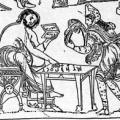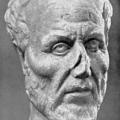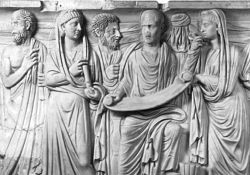87 - A God is My Co-Pilot: the Life and Works of Plotinus
Peter introduces Plotinus, the greatest philosopher of late antiquity and the founder of Neoplatonism.
Themes:
For the works of Plotinus the best English translations are the 7 volume Loeb series, by A.H. Armstrong, with facing page Greek, or the newer English version under the general editorship of L.P. Gerson: Plotinus: The Enneads (Cambridge: 2018). The evocative older translation of S. MacKenna is available here or from Penguin books. Both include Porphyry’s Life of Plotinus.
• P. Adamson, Studies on Plotinus and al-Kindī (Aldershot: 2014).
• G. Clark, “Philosophic Lives and the Philosophic Life: Porphyry and Iamblichus,” in T. Hägg and P. Rousseau, Greek Biography and Panegyric in Late Antiquity (Berkeley: 2000), 29-51.
• R. Dufour, Plotinus: A Bibliography 1950–2000 [special issue of Phronesis] (Leiden: 2002).
• E.K. Emilsson, Plotinus (London: 2017).
• L.P. Gerson, Plotinus (London, 1998).
• L.P. Gerson (ed.), The Cambridge Companion to Plotinus (Cambridge: 1996).
• L.P. Gerson and J. Wilberding (eds), The New Cambridge Companion to Plotinus (Cambridge: 2022).
• D. O’Meara, Plotinus: an Introduction to the Enneads (Oxford: 1993).
• J.M. Rist, Plotinus: The Road to Reality (Cambridge: 1967).
Stanford Encyclopedia: Plotinus







Comments
Great start to the
Great start to the Neoplatonism series, I look forward to the rest!
I have a quick question, do you know of any online sources where I could sample the Armstrong translation? I have the MacKenna, but I′ve never found it to be particularly good reading.
In reply to Great start to the by JKE
Armstrong translation
Well, no doubt it could be downloaded illegally from somewhere but as far as I know Armstrong is not on the internet. It is a far better translation, though, and also is printed facing the Greek. The only downside is that it is 7 volumes so buying all of it is a bit pricey.
Greek terminilogy
I seem to remember that in one of the episodes (on Neoplatonism?) a Greek term was mentioned that is used to signal that the statement being made (about God) is not to be taken literally (as this would create a problem for negative theology). Do you remember such a term being mentioned?
In reply to Greek terminilogy by Berl Dov Lerner
Non-literal
Maybe I mentioned when talking about Plotinus, Enneads 6.8 that he modifies positive statements about the one with "as if" - the Greek is "hoion".
neo-platonic problem of forms and becoming
Dear professor. Here is a question regarding neoplatonism that i am struggling with.
The platonic idealist tradition posits that the forms and reason principles of all things precede their material instantiations and that the logos themselves are unchanging and eternal. The world of becoming is merely a corrupted reflection, like a 2d rendition of a 3d object.
But here is the problem. When we analyze and contemplate "essences", we realize that no thing or essence that we can contemplate make any sense outside of the world of becoming, and especially without death. Lets take your favourite example of a giraffe. We might say that the essence of a giraffe is "long necked mammal".
But why do giraffes have long necks? Well in order to eat from the tall trees. But why do giraffes need to eat from the trees in the first place? To stay alive! Here we come to the almost proto-darwinian insight that death has a sort of "causality". Nature is fundamentally built around survival, but both survival and death are features of the material world of becoming. This creates a kind of bottom-up causality (from a platonic point of view) which simply doesnt work. Essences can not be "influenced" by death or the relations of the material world Because there is no death or change in the world of the forms or inte divine intellect and the world of forms precede the material realm.
In reply to neo-platonic problem of forms and becoming by Olle Koort
Teleology in Plotinus
Interesting question! There is a lot to think about here and firstly I should point you to the work of James Wilberding who has numerous relevant publications, I also interviewed him on the podcast. Generally though, Plotinus will say that natural features of animal and plant species are not somehow explained bottom-up, as you put it. They will always be rooted in the intelligible form; there is even a passage where Plotinus says that things like claws and teeth are "already there" in Intellect. Obviously death, injury, illness etc are not features in the Intellect, they only emerge in the material realm, which raises the question of why animals in the Intelligible need claws for self-defense, for instance (I think the long neck is less of a problem: the intelligible giraffe already has the nature of tree-leaf-eater and so we can explain the neck in terms of good, teleological features of the species). Here I think the best we can do is probably to say that Intellect is providential and already gives the animal species everything it will need in a material context even though the problems of that context are not present in the intelligible world.
In reply to Teleology in Plotinus by Peter Adamson
Thank you for your response.
Thank you for your response. Its an interesting solution which seems to have some grounding in Plotinus idea of providence, but i also feel there is a certain tension here within Plotinus philosophy since he on several occasions strongly imply that the Divine Intellect (Nous) is completley self absorbed and has no knowledge of or engagement with the lower realities. Is that not what distinguishes the soul, who knows both the intelligible and the material, from the intellect which only knows itself?
In reply to Thank you for your response. by Olle Koort
Self knowledge of intellect
It's certainly true that the Intellect does not direct its attention downwards, but only at itself. Also Plotinus argues in several places that Intellect does not engage in "planning" to design a world, the world just proceeds from it automatically and eternally. However, I think he would object to the implication behind what you are asking, namely that there might be something to "know" about the cosmos (or soul) that Intellect does not know. All reality at the lower level is only an image of real Being which is internal to Intellect, so worrying that Intellect is self-absorbed and is thus missing something, so to speak, would be like worrying that someone doesn't know Socrates because she has met Socrates but not seen a painting of him.
gods
Good morning, what Plotinus think about pagan gods? regards
In reply to gods by diego
Pagan gods in Plotinus
Good question. Unlike other Neoplatonists, such as Proclus, he actually says very little about them. When he does it is often for some specific, exegetical reason like when he talks about Aphrodite and Eros in a treatise on love, where he brings in the gods because he is commenting on Plato's Symposium. Similarly he talks about "daemons" in the context of explaining passages about daimons in the Platonic dialogues. (I published an article on this a while back: “‘Present without Being Present’: Plotinus on Plato’s Daimon,” in Rereading Ancient Philosophy: Old Chestnuts and Sacred Cows, ed. V. Harte and R. Woolf (Cambridge: Cambridge University Press, 2017), 257-75). In general what he tends to do with pagan religious material is that he accepts it, but gives it a rather metaphorical philosophical interpretation e.g. that the daimon is a higher part of the soul that leads the rest of the soul towards perfection.
It may be that as Christianity came to dominance in late antiquity the Platonists were driven to insist more on the importance of pagan religious ideas, as a counterweight and attempt to show that their religion was more rational; but Plotinus does not yet reflect much if at all on Christianity, he does react to the Gnostics and makes fun of their system of deities.
In reply to Pagan gods in Plotinus by Peter Adamson
thank you, I'm very…
thank you, I'm very interested in the speech of the Gods. it must be said that from what little I have explored the Neoplatonists themselves, however, had very different ideas on the subject. what is your idea about polytheism? only legends?
In reply to thank you, I'm very… by diego
Polytheism
Well, polytheism obviously comes up in many philosophical traditions, not only Greek but also Indian, African, etc. So it has been discussed a lot here on the podcast e.g. in Africana episode 18. One issue that comes up in many of these traditions is whether the divine is in fact a unity, and then traditional plural gods could be names for this one God; that is something you'd find Plotinus tending to say, but Proclus tending to reject, for instance.
In reply to Polytheism by Peter Adamson
Is it crazy to think that…
Is it crazy to think that many supernatural entities really coexisted? maybe they are not myths ....
In reply to Is it crazy to think that… by diego
Supernatural entities
Well, I would never describe any belief that has been held by so many people as "crazy." But it does seem to have gone steadily out of fashion, at least.
In reply to Supernatural entities by Peter Adamson
not crazy?
Not so fast, Professor :). 70 million people just voted for someone who cannot distinguish something real from stuff he just made up. I see news reports of protests whose participants believe that coronavirus is not real, just a hoax (apparently the health establishment in all US states and countries as disparate as Iran, South Africa, Portugal, Peru, Canada...and 200 others, are, according to these skeptics, colluding to pull the wool over their eyes). I don't know the psychiatric or philosophical definition of "crazy," but it hits me that lots of craziness exists.
whole series
I found this podcast searching "Augustine" on Spotify. Mighty glad I found it. Excellent.
Add new comment